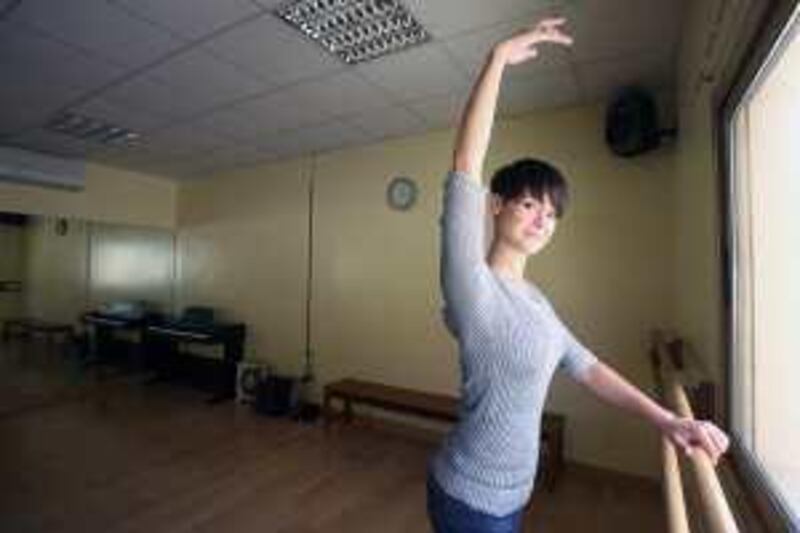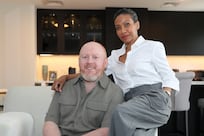For this ballet dancer in Dubai, managing finances has always been a balacing act. After working a variety of jobs, she now co-owns a flat in the UK and keeps her spending in check I've never put money aside for a rainy day. And I still don't, but I bought a house in my home village of Lichfield, in the UK, in 2006. I have to credit my ex-partner for organising that. He's really sensible with money and I would never have done that on my own, firstly because I couldn't have afforded to, and secondly because I don't think a self-employed ballet teacher, working three part-time jobs, would have been approved for a mortgage.
But we did it. The property is a huge 1960s flat, and when we bought it for £108,000 (Dh634,315) it was in a right state. It was disgusting, with woodchips on all the walls and old newspapers everywhere. I think the man who lived there before died in it. We got it for a really good price considering its desirable postcode, and although we are no longer together we are great friends and keep it on as an investment.
After we got the mortgage, we took out a credit card with a limit of £5,000 - very low considering what we needed it for, which was to do the whole place up. And we stuck to it, which was amazing because it needed all new wall coverings, carpets, a new bathroom and a refurbished kitchen. We also had to move the boiler. When we could, we re-mortgaged for a bit more and paid off the credit card, and used the remainder to buy the freehold of the property. The flat is currently leasehold, so we're saving up to buy the freehold, which will cost around £10,000. We don't have it yet, as it is still being processed at the moment, which is fine because it means I have more time to save for it.
That's the only money I put aside - £100 a month into a joint account, to cover any expenses arising out of the property. I don't miss that each month. I think the flat, if we were to sell it, is now worth around £135,000, which shows good growth considering the recession and fall in property prices. And our tenant, who pays £500 per month, covers the mortgage. I should be good with money, because I was brought up to be, but I'm just too laid-back. My dad can't understand why I don't pay my credit cards on time. He's always reminding me that I pay interest needlessly by leaving things until the last minute. He left school at an early age and went to work in the local supermarket, where he met my mum. He put himself through night school and university and is now a director of a company he part-owns. Not bad for someone who used to come home with frozen fingers from working the freezer section.
We were never rich growing up, although my younger sister, who is 18, got spoiled far more than me or my older sister. She's 27, and I'm 26 years old. As a child I didn't get a set amount of pocket money a week, but if I did an odd job at home I'd sometimes get a bit of change - a few pounds. My first proper paying job was a horrific paper round in a village just outside Lichfield. I was 13 and dancing so much that I was tiny, and the bag in which I hauled the papers was huge. I used to dread picking up those huge piles of papers. I think I got something ridiculous, like £4.30 for the whole round each week.
It used to take about two and a half hours every day. When I was growing up, my parents never bought us amazing things like designer clothes, and we'd have to share a big Christmas present. But we never wanted for anything. I didn't go abroad until I was 15, but we never felt as if we went without, and we probably had a better childhood than those whose parents spent a fortune on them, mainly because we had so much fun together.
I have always had a job of some kind ever since I was 13. When I was 16, I waitressed and worked part-time in a curtain shop. I had dance lessons on Saturdays, and my parents paid for those but made sure I knew to appreciate it. I'd fit in schoolwork around all of these things. I earned fairly modest money in these jobs - the UK minimum wage rate of around £3.50 per hour. I used the money to pay for my ballet clothes and equipment because I didn't want to ask my parents for more.
They already paid for my lessons, and then, beginning in 1999, my two-year ballet teaching course, which cost around £1,000 per term. There were six terms in total. I started teaching in 2000 in Lichfield, but worked part-time in the curtain shop because the hours I did teaching weren't enough to survive on. The curtain shop became more and more full-time, which started to encroach on my teaching.
I came to Dubai in 2008 to work at The Ballet Centre in Jumeirah. That has been the first time I have had only one job at a time. I would say that I still work around the same number of teaching hours as back in Lichfield, but I earn as much here as I did with those three jobs combined. It's also much easier to get one salary each month rather than three separate and variable incomes. But here, the only thing I save for at the moment is my rent, which is Dh3,500 a month, and bills.
I get about Dh200 from my employer for petrol, but I haven't had a pay rise since the day I got here. I go out maybe once a week. I'll do the ladies' nights and try and not spend too much, although I did spend around Dh350 the other night, which I think is a lot, especially if you convert it into sterling. In Dubai, even soft drinks are expensive. I would probably use that Dh350 on a month's worth of nights out in Lichfield, where you can go out with about Dh50 in your pocket and still manage to enjoy yourself.
I'm quite lucky that I don't really like shopping, and I never go shopping for the sake of it. I will buy something only if I really need it. When it comes to my groceries, I've been trying out a few different methods, either a big shop at the beginning of the week or buying what I need each evening. So far it seems cheaper to buy what I need each night, even though I thought going into Spinneys every night would cost more.
I don't use credit cards anymore. I am paying off one or two UK credit cards, which I'd built up to a balance of around one or two thousand pounds. I pay the cards off each month. Once those are cleared, I hope to start saving properly. * As told to Jola Chudy






